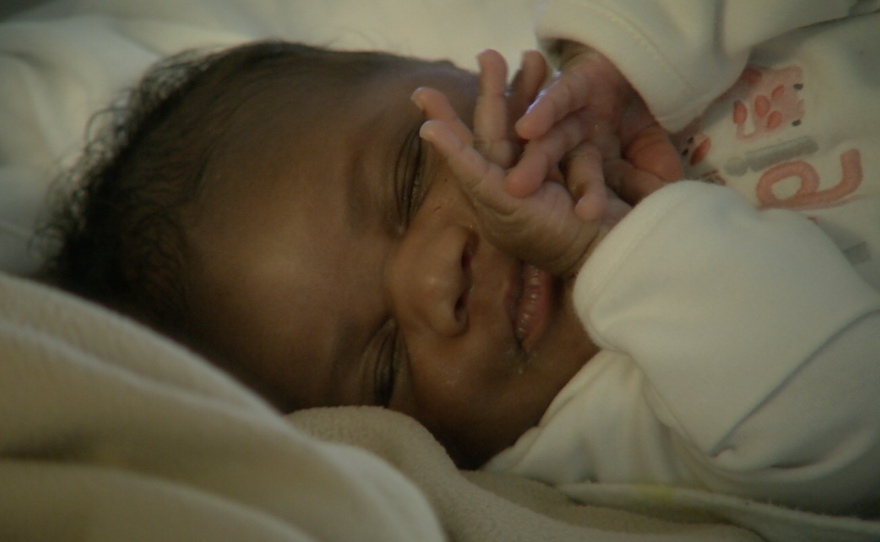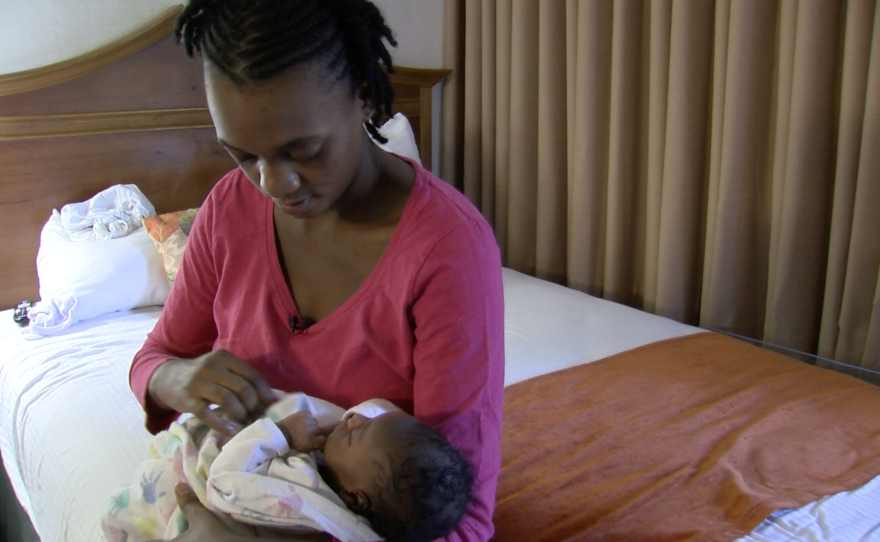Nine months pregnant, 24-year-old Sandra Alexandre crossed rivers and climbed mountains, traveling through some of the most dangerous countries in the world.
I am David Wagner. It is Wednesday, October 5. The influx of Haitian migrants at the U.S.-Mexico border shows no signs of slowing down soon. Last month, the U.S. Department of Homeland Security shifted its immigration policy and said it would detain or deport Haitians arriving in the U.S. But that doesn't seem to be deterring migrants from reaching the port of entry. The shift in policy is having major consequences for Haitian families. Joining us with more on the situation is reporter Jean Guerrero. Thank you for being here. >> Thank you. >> Take us back. When did we start seeing this increase in the number of migrants from Haiti at the U.S. border? >> The influx really started in the late spring. If you look at the numbers so far this year, we have seen more than 5000 Haitians arrive compared with last year about 339. There was just a huge influx we started seeing where thousands of Haitians started coming across. >> And you have spoken to many of these migrants. They are staying on the streets and in shelters in Tijuana right now. Quited they say they are coming to the U.S. and why do they say they are coming now? >> Most of these Haitians who are appearing at the border right now moved to Brazil after the devastating earthquake in Haiti. However, they moved there to get jobs and start life over. In recent years, we have seen political and economic crises unfold in Brazil. For example, the president was recently impeached. This is literally one of the worst economic downturns in Brazil's history. It is plagued by high debt, high unemployment rates, and immigrants who come from abroad are the ones who have the hardest time finding jobs. These Haitians, they felt they can't return to Haiti because of the high crime rates and lack of education and health services so they have decided to make this very dangerous journey through Latin America through some of the most dangerous countries in the world to come to the United States and try to find new opportunities here. >> So we're really seeing how natural disasters that may have happened years ago can still have these ripple effects on immigration here in San Diego. >> Exactly. >> In the meantime, while all this has been happening, how has immigration policy toward Haitians shifted? >> For years, after the earthquake, Haitians without he says were allowed to enter the U.S. on a humanitarian parole permission but as of September 22, Haitians without visas are being placed in detention centers if they arrive at the border and they will be deported unless they can prove they fear returning home. >> Is spoke with a woman who has been separated from her husband because of this change in policy. Can you change -- tell us a little bit about her situation? >> Her name is Sandra Alexander. She made the journey and she was nine months pregnant. She crossed the border before her fiancé, bypassing long lines. Most people have to wait for weeks because there is so many people coming right now but they made an exception because she was so pregnant and before her fiancé could cross, he ended up -- the policy ended up changing so now he is stuck in Mexico. His baby was recently born here and he hasn't met her. >> I think we have a clip from this woman. >> Translator: It's very difficult for me and for the baby. I don't know when he is going to come here. >> Do we have any sense of how many families are in a situation like this? How many families have been separated and is anything being done to reunite them? >> About 50 families have been separated in this way according to immigrant rights groups in San Diego. There is a petition going around by alliance San Diego asking the government to allow these families to reunite with of the border. >> So we see right now that the U.S., this change in policy is sort of closing the door on Haitian -- Haitian migrants. Meanwhile, recently we have been seeing it another natural disaster hitting Haiti pretty hard. Do you have any sense of whether this could lead to another influx of migrants trying to get into the U.S.? >> That very well could happen. Right now, the UN secretary-general deputy special representative for Haiti said hurricane Matthew represented the largest humanitarian event in Haiti since the earthquake. It is very serious and San Diego immigrant rights consumers are asking the U.S. government now to reinstate the military and eight and essentially change the immigration policy back to what it was a few weeks ago because one of the reasons -- one of the reasons for changing it was the improved situation in Haiti that Haiti has been newly devastated. >> But if the earthquake is any indication, we could be seeing ripple effects of this for years to come. >> That could be. >> What does the future look like for people who are currently on the other side of the border trying to get into the U.S.? >> For a while, there was a lot of confusion about what these Haitians were actually going to do. There was talk they would end up staying in Tijuana because they didn't want to risk being put into detention centers and then sent back to Haiti. When migrants are put in detention centers in the United states, they can't be deported to Mexico unless they are Mexican. So they don't want to go back to Haiti because -- so many of them are saying I might stay in Mexico but we have seen a majority of them crossing anyway. They are so desperate they are crossing even though they know they will be put in detention centers and possibly deported. >> I have been speaking with reporter Jean Guerrero. Thanks so much for being here. >> Thanks so much.
She had one goal: to make it to the U.S.
"It's too difficult, I won't make it," Alexandre recalled telling her fiancé and travel companion, Volcy Dieumercy, somewhere between Colombia and Panama. "Volcy said, 'yes, yes you can make it, little by little, but you are going to make it. Be brave.'"
She did make it. But Dieumercy did not — at least not yet. Because of her pregnancy, Alexandre was allowed into the country before Dieumercy, bypassing long wait times at the ports of entry. Within hours, the U.S. announced it was tightening immigration restrictions on Haitians for the first time since the devastating 2010 earthquake.
Dieumercy was stuck in Mexico. His baby — named Nova Vitoria, which means "new victory" — was born in San Diego on Sept. 25. Dieumercy missed the birth, and he still hasn't met his daughter.
“I want him to come here so we can live together," Alexandre said. "As a family."
The couple is among tens of thousands of Haitians who left Brazil, where they had moved after the earthquake, and headed to the U.S. this year, fleeing economic and political turmoil in the South American nation.
For years, Haitians without visas were allowed to enter the U.S. on a humanitarian parole provision. Now, those same people are being placed in detention centers. After Haiti's presidential elections on Oct. 9, the U.S. will attempt to deport them to Haiti unless they prove they fear returning.
On Friday, Dieumercy was finally able to speak with a U.S. immigration official at the Calexico Port of Entry. He is currently in a detention facility.
Immigrant rights activists say about 50 families have been separated. Alliance San Diego recently launched a petition asking the U.S government to let families like Alexandre's reunite north of the border.
Alexandre said she wishes she had known the policy was going to change prior to making the risky journey.

"They should have told us before. Not like this," she said. "It's very difficult for me and the baby."
Going back to Haiti, she said, is not an option.
“In Haiti, life is very difficult. Very, very, very difficult. It’s so dangerous too," she said.







